Fleurs du Mal Magazine


∗The photo book Streetdreamers from David van Reen (1969-2015) is published posthumously as a tribute to ‘his family’: the streetdreamers in Ethiopia.

David was a sportsman. Working as a trainer in Kenya and Ethiopia, he encountered the people living on the streets on a daily basis: the elderly, children, the disabled, the blind and many more. He decided to do something about it.
With the help of his parents and friends, he founded the Lalibela Foundation in the town of Lalibela, known for its rock-hewn churches. At the same time, he began processing what he saw and experienced by writing, photographing and painting. Several of his books were published between 2008 and 2015, starting with his impressive book of photographs Het land van de verbrande gezichten (The Land of the Burned Faces) and two novels about life in Africa, which he had come to know well.
 In the novel Engelen der wrake (The Avenging Angel), David confronts the reader with the tragic living conditions of people in the Kenyan slums, a harsh, ruthless world plagued by vicious gangs, where residents draw hope from friendship and the trust they have in each other. Anbessa’s dochter (Anbessa’s Daughter), a vivid narrative about people on the lowest rung of society in Ethiopia, is based on the everyday realities of the main characters, who despite everything try to make something beautiful out of their lives.
In the novel Engelen der wrake (The Avenging Angel), David confronts the reader with the tragic living conditions of people in the Kenyan slums, a harsh, ruthless world plagued by vicious gangs, where residents draw hope from friendship and the trust they have in each other. Anbessa’s dochter (Anbessa’s Daughter), a vivid narrative about people on the lowest rung of society in Ethiopia, is based on the everyday realities of the main characters, who despite everything try to make something beautiful out of their lives.
The portraits and landscapes in Het land van de verbrande gezichten reflect his vision of the people of Ethiopia, their culture, their life within family clans, and their religion. In Streetdreamers, he portrays life on the streets: there are many thousands of homeless people in capital city, Addis Ababa.
Streetdreamers
by David van Reen
Publisher: VanSpijk ArtBooks
First edition 2024
Language: English
Hardcover
192 pages
ISBN-10 :9062169651
ISBN-13 :978-9062169658
24.7 x 2.3 x 29.5 cm
€29,50
•fleursdumal.nl magazine
More in: - Book Lovers, - Book News, - Book Stories, - Bookstores, Archive Q-R, David van Reen, David van Reen Photos, FDM in Africa, Photography
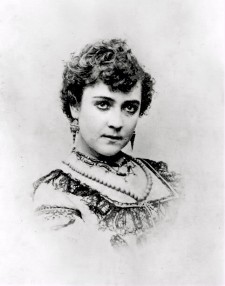
Answer Me
I
In from the night.
The storm is lifting his black arms up to the sky.
Friend of my heart, who so gently marks out the lifetrack for me, draw near to-night;
Forget the wailing of the low-voiced wind:
Shut out the moanings of the freezing, and the starving, and the dying, and bend your head low to me:
Clasp my cold, cold hands in yours;
Think of me tenderly and lovingly:
Look down into my eyes the while I question you, and if you love me, answer me—
Oh, answer me!
II
Is there not a gleam of Peace on all this tiresome earth?
Does not one oasis cheer all this desert-world?
When will all this toil and pain bring me the blessing?
Must I ever plead for help to do the work before me set?
Must I ever stumble and faint by the dark wayside?
Oh the dark, lonely wayside, with its dim-sheeted ghosts peering up through their shallow graves!
Must I ever tremble and pale at the great Beyond?
Must I find Rest only in your bosom, as now I do?
Answer me—
Oh, answer me!
III
Speak to me tenderly.
Think of me lovingly.
Let your soft hands smooth back my hair.
Take my cold, tear-stained face up to yours.
Let my lonely life creep into your warm bosom, knowing no other rest but this.
Let me question you, while sweet Faith and Trust are folding their white robes around me.
Thus am I purified, even to your love, that came like John the Baptist in the Wilderness of Sin.
You read the starry heavens, and lead me forth.
But tell me if, in this world’s Judea, there comes never quiet when once the heart awakes?
Why must it ever hush Love back?
Must it only labor, strive, and ache?
Has it no reward but this?
Has it no inheritance but to bear—and break?
Answer me—
Oh, answer me!
IV
The Storm struggles with the Darkness.
Folded away in your arms, how little do I heed their battle!
The trees clash in vain their naked swords against the door.
I go not forth while the low murmur of your voice is drifting all else back to silence.
The darkness presses his black forehead close to the window pane, and beckons me without.
Love holds a lamp in this little room that hath power to blot back Fear.
But will the lamp ever starve for oil?
Will its blood-red flame ever grow faint and blue?
Will it uprear itself to a slender line of light?
Will it grow pallid and motionless?
Will it sink rayless to everlasting death?
Answer me—
Oh, answer me!
V
Look at these tear-drops.
See how they quiver and die on your open hands.
Fold these white garments close to my breast, while I question you.
Would you have me think that from the warm shelter of your heart I must go to the grave?
And when I am lying in my silent shroud, will you love me?
When I am buried down in the cold, wet earth, will you grieve that you did not save me?
Will your tears reach my pale face through all the withered leaves that will heap themselves upon my grave?
Will you repent that you loosened your arms to let me fall so deep, and so far out of sight?
Will you come and tell me so, when the coffin has shut out the storm?
Answer me—
Oh, answer me!
Adah Isaacs Menken
(1835 – 1868)
Answer Me
•fleursdumal.nl magazine
More in: - Archive Tombeau de la jeunesse, Archive M-N, Archive M-N, Menken, Adah, THEATRE
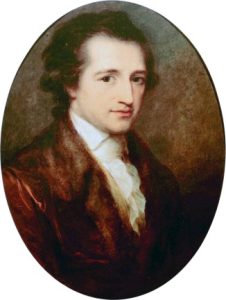
Philine
Singet nicht in Trauertönen
Von der Einsamkeit der Nacht!
Nein, sie ist, o holde Schönen,
Zur Geselligkeit gemacht.
Wie das Weib dem Mann gegeben
Als die schönste Hälfte war,
Ist die Nacht das halbe Leben,
Und die schönste Hälfte zwar.
Könnt ihr euch des Tages freuen,
Der nur Freuden unterbricht?
Er ist gut, sich zu zerstreuen;
Zu was anderm taugt er nicht.
Aber wenn in nächt′ger Stunde
Süßer Lampe Dämmrung fließt,
Und vom Mund zum nahen Munde
Scherz und Liebe sich ergießt;
Wenn der rasche lose Knabe,
Der sonst wild und feurig eilt,
Oft bei einer kleinen Gabe
Unter leichten Spielen weilt;
Wenn die Nachtigall Verliebten
Liebevoll ein Liedchen singt,
Das Gefangnen und Betrübten
Nur wie Ach und Wehe klingt:
Mit wie leichtem Herzensregen
Horchet ihr der Glocke nicht,
Die mit zwölf bedächt′gen Schlägen
Ruh′ und Sicherheit verspricht!
Darum an dem langen Tage
Merke dir es, liebe Brust:
Jeder Tag hat seine Plage,
Und die Nacht hat ihre Lust.
Johann Wolfgang von Goethe
(1749-1832)
Philine
•fleursdumal.nl magazine
More in: Archive G-H, Archive G-H, Goethe, Johann Wolfgang von, J.W. von Goethe
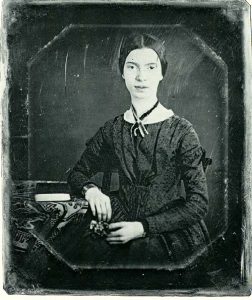
Because I could not stop
for Death
Because I could not stop for Death –
He kindly stopped for me –
The Carriage held but just Ourselves –
And Immortality.
We slowly drove – He knew no haste
And I had put away
My labor and my leisure too,
For His Civility –
We passed the School, where Children strove
At Recess – in the Ring –
We passed the Fields of Gazing Grain –
We passed the Setting Sun –
Or rather – He passed Us –
The Dews drew quivering and Chill –
For only Gossamer, my Gown –
My Tippet – only Tulle –
We paused before a House that seemed
A Swelling of the Ground –
The Roof was scarcely visible –
The Cornice – in the Ground –
Since then – ’tis Centuries – and yet
Feels shorter than the Day
I first surmised the Horses’ Heads
Were toward Eternity –
Emily Dickinson
(1830—1886)
Because I could not stop for Death
• fleursdumal.nl magazine
More in: Archive C-D, Archive C-D, Dickinson, Emily
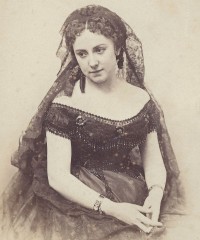
Dreams of Beauty
Visions of Beauty, of Light, and of Love,
Born in the soul of a Dream,
Lost, like the phantom-bird under the dove,
When she flies over a stream—
Come ye through portals where angel wings droop,
Moved by the heaven of sleep?
Or, are ye mockeries, crazing a soul,
Doomed with its waking to weep?
I could believe ye were shadows of earth,
Echoes of hopes that are vain,
But for the music ye bring to my heart,
Waking its sunshine again.
And ye are fleeting. All vainly I strive
Beauties like thine to portray;
Forth from my pencil the bright picture starts,
And—ye have faded away.
Like to a bird that soars up from the spray,
When we would fetter its wing;
Like to the song that spurns Memory’s grasp
When the voice yearneth to sing;
Like the cloud-glory that sunset lights up,
When the storm bursts from its height;
Like the sheet-silver that rolls on the sea,
When it is touched by the night—
Bright, evanescent, ye come and are gone,
Visions of mystical birth;
Art that could paint you was never vouchsafed
Unto the children of earth.
Yet in my soul there’s a longing to tell
All you have seemed unto me,
That unto others a glimpse of the skies
You in their sorrow might be.
Vain is the wish. Better hope to describe
All that the spirit desires,
When through a cloud of vague fancies and schemes
Flash the Promethean fires.
Let me then think of ye, Visions of Light,
Not as the tissue of dreams.
But as realities destined to be
Bright in Futurity’s beams.
Ideas formed by a standard of earth
Sink at Reality’s shrine
Into the human and weak like ourselves,
Losing the essence divine;
But the fair pictures that fall from above
On the heart’s mirror sublime
Carry a signature written in tints,
Bright with the future of time,
And the heart, catching them, yieldeth a spark
Under each stroke of the rod—
Sparks that fly upward and light the New Life,
Burning an incense to God!
Adah Isaacs Menken
(1835 – 1868)
Dreams of Beauty
•fleursdumal.nl magazine
More in: - Archive Tombeau de la jeunesse, Archive M-N, Archive M-N, Menken, Adah, THEATRE

Vorfrühling
In dieser Märznacht trat ich spät aus meinem Haus.
Die Straßen waren aufgewühlt von Lenzgeruch und grünem Saatregen.
Winde schlugen an. Durch die verstörte Häusersenkung ging ich weit hinaus
Bis zu dem unbedeckten Wall und spürte: meinem Herzen schwoll ein neuer Takt entgegen.
In jedem Lufthauch war ein junges Werden ausgespannt.
Ich lauschte, wie die starken Wirbel mir im Blute rollten.
Schon dehnte sich bereitet Acker. In den Horizonten eingebrannt
War schon die Bläue hoher Morgenstunden, die ins Weite führen sollten.
Die Schleusen knirschten. Abenteuer brach aus allen Fernen.
Ueberm Kanal, den junge Ausfahrtwinde wellten, wuchsen helle Bahnen,
In deren Licht ich trieb. Schicksal stand wartend in umwehten Sternen.
In meinem Herzen lag ein Stürmen wie von aufgerollten Fahnen.
Ernst Stadler
(1883 – 1914)
Vorfrühling
•fleursdumal.nl magazine
More in: *War Poetry Archive, - Archive Tombeau de la jeunesse, Archive S-T, Archive S-T, Stadler, Ernst
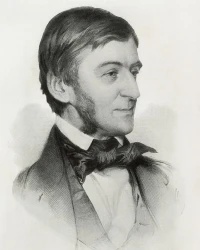
The Past
The debt is paid,
The verdict said,
The Furies laid,
The plague is stayed,
All fortunes made;
Turn the key and bolt the door,
Sweet is death forevermore.
Nor haughty hope, nor swart chagrin,
Nor murdering hate, can enter in.
All is now secure and fast;
Not the gods can shake the Past;
Flies-to the adamantine door
Bolted down forevermore.
None can re-enter there,—
No thief so politic,
No Satan with a royal trick
Steal in by window, chink, or hole,
To bind or unbind, add what lacked,
Insert a leaf, or forge a name,
New-face or finish what is packed,
Alter or mend eternal Fact.
Ralph Waldo Emerson
(1803 – 1882)
The Past
•fleursdumal.nl magazine
More in: Archive E-F, Archive E-F, Emerson, Ralph Waldo
Thank you for reading Fleurs du Mal - magazine for art & literature